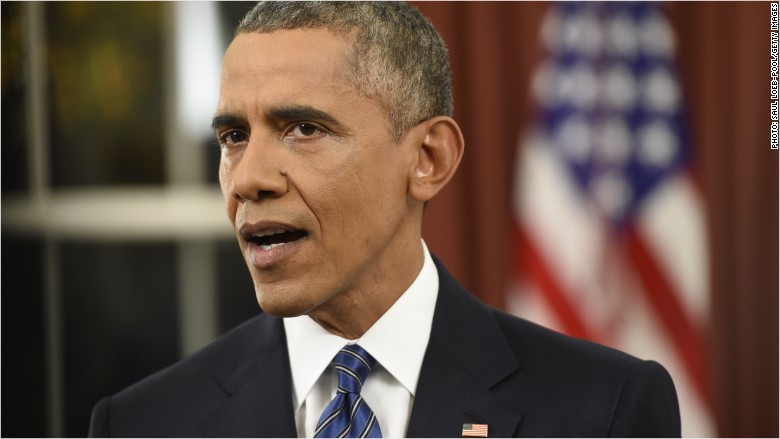
President Obama said in a private meeting this week that he initially failed to understand the level of national anxiety in the wake of the Paris and San Bernardino terrorist attacks, in part, because he didn't watch enough cable news.
In an off-the-record meeting with journalists on Tuesday, Obama said that he did not watch enough cable news to fully recognize the extent of people's fears, sources with knowledge of the meeting told CNN. That characterization of Obama's remarks was included in a New York Times article, but later removed while the article was being edited for the print edition.
The president's claim has drawn fierce criticism from conservatives, who see it as evidence that Obama is out of touch with national sentiment about the threat of terrorism.
"An American president needs to consume more panel debates to properly assess public anxiety after terrorist events?" wrote Noah Rothman, an editor at the conservative magazine Commentary.
Related: New York Times revises 'garbled' report on San Bernardino shooters
Ron Fournier, the National Journal columnist, called it "breathtaking," while the Wall Street Journal's James Taranto urged people to imagine the media outcry that would have occurred had former president George W. Bush made a similar remark.
White House spokespeople did not respond to a request for comment regarding the president's remarks.
The meeting, which took place in the White House Roosevelt Room, included journalists, columnists and editors from the Times, The Washington Post and The Atlantic, as well as digital outlets like Yahoo, Slate, Vox and Mic. Per the ground rules, attendees were not allowed to discuss the meeting or attribute any remarks to the president.
Yet the purpose of these off-the-record meetings, which have been a feature of Obama's tenure, is to influence the national dialogue. The White House achieved that goal on Wednesday when the Post's David Ignatius, who was at the meeting, penned a column based almost entirely on Obama's remarks without any mention of the meeting.
In addition to detailing Obama's thoughts on his ISIS strategy, Ignatius' column alluded to the president's remark about cable news: "Obama seems to have realized that he was slow to respond to public fear after the jihadist attacks in Paris and San Bernardino, Calif.," Ignatius wrote. "His low-decibel approach led the public to worry he wasn't doing enough to keep the country safe. Obama, not a cable television fan, apparently didn't realize the state of anxiety."
Related: Fox News suspends two for profanity while discussing President Obama
It soon became clear that the source for Ignatius' article was the president himself. On Thursday, The New York Times' Peter Baker and Gardiner Harris, who were not at the meeting, wrote an article about the private session based on conversations with "several people in the room."
Baker and Gardiner wrote, "In his meeting with the columnists, Mr. Obama indicated that he did not see enough cable television to fully appreciate the anxiety after the attacks in Paris and San Bernardino, and made clear that he plans to step up his public arguments."
That version was later removed from the Times article, with no mention of the omission, leading to widespread criticism from conservatives who felt the paper was covering for the White House.
Elisabeth Bumiller, the paper's Washington bureau chief, told CNN the story had simply been trimmed to fit the print edition.
Related: Larry Wilmore to host White House correspondents' dinner
"That paragraph, near the bottom of the story, was trimmed for space in the print paper by a copy editor in New York late last night. But it was in our story on the web all day and read by many thousands of readers," she wrote. "Web stories without length constraints are routinely edited for print."
Nearly every president in modern history has held off-the-record sessions with journalists, but Obama is particularly enamored of the forum. The president is said to relish the back-and-forth conversations and to talk at length, eager to convey his thinking on a particular strategy, policy or issue. For journalists, these meetings provide a more unguarded, unvarnished view of the president's thinking.
Among those present at Tuesday's meeting were the Post's Ignatius, The New York Times' Thomas Friedman and Carol Giacomo; The Atlantic's Jeffrey Goldberg, James Fallows and Peter Beinart; Yahoo's Matt Bai; Slate's Fred Kaplan; Vox's Max Fisher and Mic's Jake Horowitz. (That list, first reported by the Times, was confirmed by sources with knowledge of the meeting.)
CNNMoney's Brian Stelter contributed to this report.


